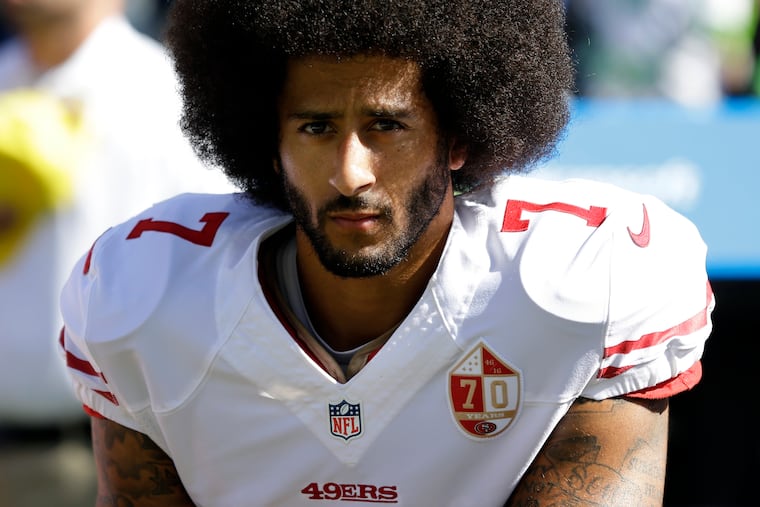The legacy of Colin Kaepernick: Young Black NFL players stay silent or be exiled | Opinion
The NFL’s message is clear: Black athletes who want fame, glory and million dollar contracts should shut up about things like police brutality and social justice and play ball.

Although NFL commissioner Roger Goodell said in 2020 that former NFL quarterback and activist Colin Kaepernick deserves a tryout with one of the 32 NFL teams, I don’t believe NFL teams will ever decide to give him one.
That’s because many white fans demand apolitical Black athletes and perceive any social commentary from them as ungratefulness. When a Black athlete decides to speak out about an issue like the unlawful police killings of Black men and women — as Kaepernick did in 2016 — those same fans who go into work on casual Fridays wearing the jerseys of Black athletes want them banned from their respective sports.
Young African American ballplayers entering the NFL in 2021 with Super Bowl and Pro Bowl dreams and fantasies should take note of Kaepernick’s cautionary tale. There are no Pro Bowls, Super Bowls, or max contracts in Kaepernick’s future. Every Sunday in the fall when the wind picks up in NFL stadiums, he’ll sit at home, because the NFL’s message is clear: Black athletes who want fame, glory, and million-dollar contracts should shut up about things like police brutality and social justice and play ball.
» READ MORE: Now do you understand why Colin Kaepernick took a knee to protest police brutality? | Jenice Armstrong
Commissioner Goodell’s sudden pang of conscience was more of an opportunity to save face and billions of dollars in revenue for NFL owners than it was for justice for Colin Kaepernick.
Teams under Goodell’s authority have refused to give him a chance; he’s remained unsigned in free agency since 2017. His rocket arm and fleet feet and keen offensive instincts have been forced to waste away for the last six — going on seven — years.
Fans will never again see him pinpointing speedy receivers 60 yards down field or his amazingly long, quick strides sprinting for crucial first downs in the NFL. Kaepernick has been forced to watch Super Bowl dramas, like the emergence of Patrick Mahomes and the resilience of Tom Brady, unfold without getting another chance to compete.
Kaepernick is the latest embodiment of a Black athlete ruining the fantasies of white fans who want Black athletes with no political opinions. In the late 1960s, Muhammad Ali was banned from boxing, his primary source of income, for three years. Curt Flood, another late 1960s athlete who lost millions of endorsement dollars in product commercials and fine art paintings sales, ended up out of baseball serving drinks somewhere in the Caribbean. Kaepernick paid a hefty price when he stood up for equality and justice, publicly protesting against the systematic police brutality and murder of people of color. He got on one knee before NFL games to express opposition to police brutality and state-sanctioned homicide against Black and brown folks in America.
Unfortunately, the minute he asserted his Blackness and chose to comment about a national problem, he became Public Enemy No.1. Though NFL commissioner Goodell later said he deserved a tryout, he said of Kaepernick in 2016: “I don’t necessarily agree with what he’s doing.” President Donald Trump weighed in saying on Sept. 23, 2017, “If a player wants to make millions of dollars in the NFL... he or she should not be allowed to disrespect our Great American flag.”
As long as Kaepernick ignored these deaths, collected his seven-figure salary, and almost took his team to victory in the Super Bowl in 2013 and the NFC championship game in 2014, he was perceived as a good guy. The message to Black athletes is clear. You are being rewarded handsomely to play a game and entertain us, but your political thoughts as a person of color whose life is in danger every time you come in contact with law enforcement should not enter into the equation.
The issue has been raised about the former Eagles strong safety Malcolm Jenkins, who was very vocal about his protests over police brutality and social activism. Jenkins did not suffer the same repercussions as Kaepernick. Unlike Kaepernick, Jenkins quietly did his work away from the football field, not in front of a national television audience right before a game.
» READ MORE: Why I march: I don’t want police violence supported by my tax dollars | Malcolm Jenkins
The majority of hard-core white fans believe Black athletes should stay in entertainment. Between quarters, during timeouts, and after the game, they can sell us the latest Nikes, 5G cellphones, Allstate, and Progressive auto insurance, and Miller High Life beer and move along in their Porsches, but we are not interested in what they think about racial and social justice issues. As the preseason games kick off this week, young Black players should not forget how Kaepernick was treated.
Raymond E. Janifer Sr., a former college athlete who played basketball and ran track at Millersville University, is professor of English and ethnic studies at Shippensburg University of Pennsylvania.